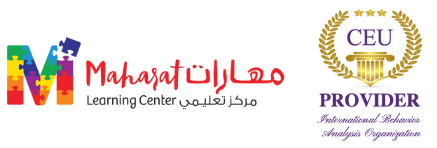Behavior analysis is a scientifically proven approach analyzing and understanding behaviour and how it is affected by the environment.The ABA therapist implements strategies and ABA principles to help many learners acquire many different skills. Since the 1960s, therapists have been applying behaviour analysis to help children with autism and related developmental disorders.
The below course list would help therapist learn principles of ABA therapy and how to implement them in a dynamic and engaging environment.
Course List
1. Registered Behavioral Therapist Course
40-hour training course that meets the BACBs new requirements for an RBT credential. This will become the official credential for behavioural therapists to verify that they have received the extensive training and guidance that qualifies them to provide the most innovative and comprehensive treatment to their clients. They will be trained and monitored to the highest level of competency, as the training is specifically designed in accordance with the RBT Task List.
RBT Task List
- Ethics and Professionalism
- Measurement
- Assessment
- Skill Acquisition
- Behaviour Reduction
- Documentation and Reporting
- This training is suitable for ABA service providers and early intervention providers and prepare them for higher level certification in applied behavioural therapy
2. Introduction to Applied Behavior Analysis
Applied Behavioral Analysis (ABA) is a systemic treatment for Autism Spectrum Disorders (ASDs) based on scientific research. It is used to teach functional and relevant skills to give young children with ASDs the tools they need to learn to succeed. Behavior analysis focuses on the principles that explain how learning takes place. Positive reinforcement is one such principle. When a behavior is followed by some sort of reward, the behavior is more likely to be repeated. Through decades of research, the field of behavior analysis has developed many techniques for increasing useful behaviors and reducing those that may cause harm or interfere with learning.
Applied behavior analysis (ABA) is the use of these techniques and principles to bring about meaningful and positive behavioral change. It is most commonly used with the treatment for Autism Spectrum Disorders (ASDs) but it can also be used to teach any functional skills, including school related skills.
3. Understanding and Managing Challenging Behaviors
Individuals with Autism Spectrum Disorder and other Developmental Disabilities often display challenging behaviors that may cause harm to themselves and/or others. Those working with these individuals have an ethical obligation to protect the safety of the individuals displaying the challenging behaviors and everyone in their environment. Safety should be protected in a dignified, scientifically-researched, and effective manner. We will discuss and practice some effective crisis management techniques. It is important to work within a competency-based crisis management system, structured to ensure successful prevention and intervention with an emphasis on safety, dignity and effectiveness
4. Functional Behavior Assessment (FBAs) and Behavior Support Plans
A structured program that teach participants the skills to evaluate and manage behaviors that disrupt classroom instruction, the teachers often address the problem by manipulating events that follow the misbehavior (e.g., verbal reprimands, isolation, detention, suspension). Participants will learn acceptable replacement behaviors (i.e., behaviors that are expected and appropriate for the circumstances.) The student may respond to the consequences for the moment, but in many instances, what has been absent is a method for determining “why” the student misbehaved in the first place. Today, there is good reason to believe that the success of classroom behavior interventions hinges on identifying the likely causes and purposes of problem behavior, as well as finding ways to teach and promote appropriate replacement behaviors that serve the same “functions” as the inappropriate behaviors.
5. Early Intervention Professional Development Program
The Early Intervention Professional Development Program has been developed to promote the inclusion of special needs children into mainstream schools and our team of specialists are trained and qualified to provide schools with the tools and training necessary to ensure the learning objectives of children are met in an inclusive educational environment.
Our training program will provide school teachers, learning support specialists, and shadow teachers with training on early intervention strategies, inclusive education, the theory and implementation of Applied Behaviour Analysis (ABA) and specific applications for children on the Autism Spectrum, children with other special educational (SEN) needs, and/or children presenting with challenging behaviour.
The training is suitable for institutes providing services to children with developmental delays and Autism Spectrum Disorders, nursery teachers and early years educators, and schools wishing to become inclusive.
6. Incidental Teaching and Natural Environment Training (NET)
Incidental teaching and Natural Environment Training (NET) is utilizing the principles of Applied Behavior Analysis (ABA) to teach in the “real world.” Instructions are both driven by the individual’s motivation and carried out in the environments that closely resemble natural environments, with structure being provided in regards to the individual’s access to reinforcement. NET leads to skills acquired in 1:1 structured teaching being utilized in generalized settings, while also being to learn new skills in less structured environments.
7. Executive Functioning (EF) and its Impact on Educational, Communication, & Daily Living Skills
This is an advanced workshop, that teach participants skills to tackle Difficulties in the area of Executive Functioning which can manifest themselves in many different ways. Some individuals pay attention to minor details, but fail to see how these details fit into a bigger picture. Others have difficulty with complex thinking that requires holding more than one train of thought simultaneously. Others have difficulty maintaining their attention, or organizing their thoughts and actions. Executive Functioning difficulties can also be associated with poor impulse control. Individuals with AS often lack the ability to use skills related to executive functioning like planning, sequencing and self-regulation.
8. Theory of Mind (THOM) and Its Impact on Social Skills (Social Competence)
The participants will learn the essentials to foster perspective taking abilities, which is a critical component for social language programming and intervention. Failure to identify and/or treat delays in theory of mind will make it hard for individuals to establish and maintain meaningful relationships.By definition, Theory of Mind is the ability to attribute independent mental states to self & others in order to understand, explain andpredict behavior. It allows people to make assumptions about other people’s feelings, desires, thoughts, knowledge, intentions, etc. so they can properly respond and often predict others behavior. Individuals with Asperger Syndrome/High Functioning Autism (HFA) can encounter difficulty recognizing and processing the feelings of others, which is sometimes referred to as “mind-blindness.” As a result of this mind-blindness, people with ASDs may not realize if another person’s behaviors are intentional or unintentional.
9. Discrete Trial Training (DTT)
Discrete Trial Training (DTT) is a method of teaching in simplified and structured steps. Instead of teaching an entire skill in one go, the skill is broken down and “built-up” using discrete trials that teach each step one at a time (Smith, 2001.) It is a one-to-one instructional approach used to teach skills in a planned, controlled, and systematic manner. DTT is used when a learner needs to learn a skill best taught in small repeated steps. Each trial or teaching opportunity has a definite beginning and end, thus the descriptor discrete trial. Within DTT, the use of antecedents and consequences is carefully planned and implemented.
The biggest misconception about DTT is that it is the same as Applied Behavior Analysis (ABA) when, in fact, DTT in just one of the methods used in ABA.
10. Introduction to Verbal Behavior / Applied Verbal Behavior (AVB)
Verbal Behaviour Therapy is based on theories of B.F. Skinner (1957) and uses the principles of Applied Behavior Analysis to teach communication skills. It is a method of teaching language that focuses on the idea that a meaning of a word is found in its function (reason.) It capitalizes on the individual’s own motivation, teaching him or her to communicate their desires. The theory is that the ability to communicate your desires may reduce problematic behavior that functioned as a means for obtaining desires.
The Verbal Behavior intervention works on developing communication skills, including receptive and expressive language across the verbal operants of mand (requesting), tact (labeling), echoics (vocal imitation) and intraverbal (conversational skills.)
11. Data Collecting and Graphing
Applied Behavior Analysis (ABA) interventions/programs are data based and research driven. Therefore, when conducting ABA interventions & programs, data is continuously collected on the targeted behaviours. This allows those running the programmes to evaluate the efficacy of the teaching and treatment implementation on an on-going basis. This data could be the percentage of correct spellings in a test, or the amount of requests made by a student to take a break from work, or the amount of time a student spends out of his seat in a classroom.
The types of data that can be collected are numerous but the purpose of collecting data is to allow those running the interventions to ‘maintain direct and continuous contact with the behaviour under investigation’ (Cooper, et al. 2007, p. 127). Regardless, of the specific target behaviours, specific data-collection procedures are utilized, including visual displays, such as, graphs or charts.
12. Principles of Toilet Training
Toilet Training It is often indicated that children with developmental disabilities generally show the same signs of ‘toileting readiness’ as that of typically developing children; however, these signs often appear when the child is older and the training might take longer. Surprisingly, the actual steps for preparing the individual for toilet training are also similar for all children, with the exception that individuals with developmental disabilities might need alternative strategies adjusted to suit their needs and/or additional instruction. Regardless, it is necessary to recognize that toilet training is largely about cooperation, communication and working together with the individual being toilet trained.
Learning Objectives
- Identify signs the individual is ready for toilet training
- Discuss the preparation for toilet training
- Discuss various types of toilet training strategies
- Discuss supplemental supports to facilitate success
13. Principles of Feeding Therapy
The training utilizes the principles of Applied Behavior Analysis (ABA) to increase behaviors related to food acceptance and decrease behaviors related to food refusal. Feeding Therapy is used as an intervention to help children acquire the skills for successful eating. Parent training is an important part of Feeding Therapy in order for the parent(s) to continue to support the child after therapy finishes.
Feeding problems and difficulties:
- Food refusal
- Food selectivity and rigidity
- Food texture sensitivities
- Rapid eating
- Forced vomiting
- Rumination (the repeated regurgitation and re-chewing of partially digested food)
- Behavioral issues
- Self-feeding
- Generalize eating behaviors across locations
Learning Objectives
- Identify signs the individual is ready for toilet training
- Discuss the preparation for toilet training
- Discuss various types of toilet training strategies
- Discuss supplemental supports to facilitate success







